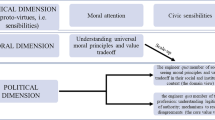Abstract
Recent attempts by American colleges and universities to teach ethics for scientists and engineers deserve strong praise. They represent a shift away from the idea that questions about ethics and morality are best left to humanists or to elder statesmen of science, a recognition that such matters ought to be an important part of education in the technical professions. One can hope that through these efforts a new generation of men and women will obtain a firm grounding in the ethical aspects of their vocations early enough to make a difference.
Access this chapter
Tax calculation will be finalised at checkout
Purchases are for personal use only
Preview
Unable to display preview. Download preview PDF.
Similar content being viewed by others
Notes
See, for example, Stephen H. Unger, Controlling Technology: Ethics and the Responsible Engineer (New York: Holt, Rinehart and Winston, 1982 ).
For a defense of this method see C. Roland Christenenet al., Teaching and the Case Method (Boston: Harvard Business School Press, 1987).
David F. Noble, America by Design: Science, Technology and the Rise of Corporate Capitalism (New York: Knopf, 1977 ).
Max Weber explores a similar issue in “Science as a Vocation,” in H.H. Gerth and C. Wright Mills, eds., From Max Weber (New York: Oxford University Press, 1946).
Lewis Mumford, The Myth of the Machine: The Pentagon of Power (New York: Harcourt Brace Jovanovich, 1970), chapter 9.
I discuss this topic in “Techne and Politeia,” in The Whale and the Reactor (Chicago: University of Chicago Press, 1986), chapter 3.
An early but overly optimistic attempt to portray computer scientists in this light can be found in Robert Boguslaw, The New Utopians: A Study of Systems Design and Social Change (Englewood Cliffs, N.J.: Prentice-Hall, 1965 ).
Jacques Ellul, The Technological Society (New York: Knopf, 1964 ).
An exception is John Tirman, ed., Empty Promise: The Growing Case against Star Wars (Boston: Beacon Press, 1986).
Jonathan Schell, The Fate of the Earth (New York: Knopf, 1982 ).
An excellent discussion of Reagan’s rhetoric here is Janice Hocker Rushing, “Ronald Reagan’s ‘Star Wars’ Address: Mythic Containment of Technical Reasoning,” Quarterly Journal of Speech 72 (1986): 415–433.
See Martin Kenneth Starr, ed., Global Competitiveness: Getting the U.S. Back on Track (New York: Norton, 1988).
Rachel Carson, Silent Spring ( Boston: Houghton Mifflin, 1962 ).
Author information
Authors and Affiliations
Editor information
Editors and Affiliations
Rights and permissions
Copyright information
© 1990 Kluwer Academic Publishers
About this chapter
Cite this chapter
Winner, L. (1990). Engineering Ethics and Political Imagination. In: Durbin, P.T. (eds) Broad and Narrow Interpretations of Philosophy of Technology. Philosophy and Technology, vol 7. Springer, Dordrecht. https://doi.org/10.1007/978-94-009-0557-3_6
Download citation
DOI: https://doi.org/10.1007/978-94-009-0557-3_6
Publisher Name: Springer, Dordrecht
Print ISBN: 978-94-010-6738-6
Online ISBN: 978-94-009-0557-3
eBook Packages: Springer Book Archive



